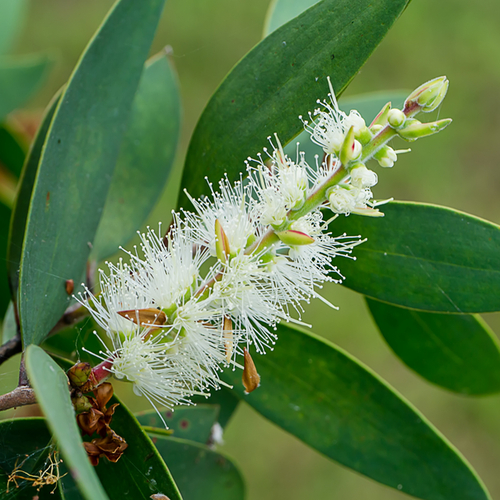
Niauli oil
Scientific names: Melaleuca viridiflora
Family: Myrtaceae
Alternate names: Aceite Niauli, Caje Oil, Huile de Niaouili, Niauli Aetheroleum
Background
Niauli oil is the oil from the leaves of the Melaleuca viridiflora plant. People use the oil to make medicine. Do not confuse niauli oil with tea tree oil and cajeput oil, which are made from different species of Melaleuca plants.
People take niauli oil by mouth or apply it directly for swelling (inflammation) of the airways, cough, and bronchitis.
People take niauli oil by mouth or apply it directly for swelling (inflammation) of the airways, cough, and bronchitis.
Safety Safety definitions
Niauli oil might be safe for most adults when taken by mouth. It can cause some side effects such as nausea, vomiting, and diarrhea. It also appears to be safe for most adults when applied directly to the skin.
Niauli oil is UNSAFE when greater than 10 grams are taken. Large amounts can cause low blood pressure, blood circulation problems, and serious breathing problems.
Pregnancy and breast-feeding: Not enough is known about the use of niauli oil during pregnancy and breast-feeding. Stay on the safe side and avoid use.
Diseases of the stomach or intestines (GI tract): If you have a disease of the GI tract that involves swelling, do not use niauli oil.
Liver disease or bile duct problems: Do not use niauli oil if you have one of these conditions.
Niauli oil is UNSAFE when greater than 10 grams are taken. Large amounts can cause low blood pressure, blood circulation problems, and serious breathing problems.
Special Precautions & Warnings:
Children: Niauli oil is UNSAFE for children when applied directly to the skin of the face or in the nose. In some children, it might cause asthma-like symptoms and other serious breathing problems.Pregnancy and breast-feeding: Not enough is known about the use of niauli oil during pregnancy and breast-feeding. Stay on the safe side and avoid use.
Diseases of the stomach or intestines (GI tract): If you have a disease of the GI tract that involves swelling, do not use niauli oil.
Liver disease or bile duct problems: Do not use niauli oil if you have one of these conditions.
Effectiveness
NatMed Pro rates effectiveness based on scientific evidence according to the following scale: Effective, Likely Effective, Possibly Effective, Possibly Ineffective, Likely Ineffective, Ineffective, and Insufficient Evidence to Rate.
Insufficient evidence Effectiveness definitions
- Cough.
- Bronchitis.
- Swelling (inflammation) of the airways.
- Other conditions.
Dosing & administration
The appropriate dose of niauli oil depends on several factors such as the user’s age, health, and several other conditions. At this time there is not enough scientific information to determine an appropriate range of doses for niauli oil. Keep in mind that natural products are not always necessarily safe and dosages can be important. Be sure to follow relevant directions on product labels and consult your pharmacist or physician or other healthcare professional before using.
Interactions with pharmaceuticals
It is not known if Niauli oil interacts with any medicines. Before taking Niauli oil, talk with your healthcare professional if you take any medications.
Interactions with herbs & supplements
There are no known interactions with herbs and supplements.
Interactions with foods
There are no known interactions with foods.
Action
Niauli oil contains chemicals that might help stimulate blood circulation and kill bacteria and germs.
vital.ly has licensed monographs from TRC Healthcare.
This monograph was last reviewed on 16/11/2023 11:00:00 and last updated on 11/01/2013 19:32:19. Monographs are reviewed and/or updated multiple times per month and at least once per year.
Natural Medicines disclaims any responsibility related to medical consequences of using any medical product. Effort is made to ensure that the information contained in this monograph is accurate at the time it was published. Consumers and medical professionals who consult this monograph are cautioned that any medical or product related decision is the sole responsibility of the consumer and/or the health care professional. A legal License Agreement sets limitations on downloading, storing, or printing content from this Database. No reproduction of this monograph or any content from this Database is permitted without written permission from the publisher. It is unlawful to download, store, or distribute content from this site.




